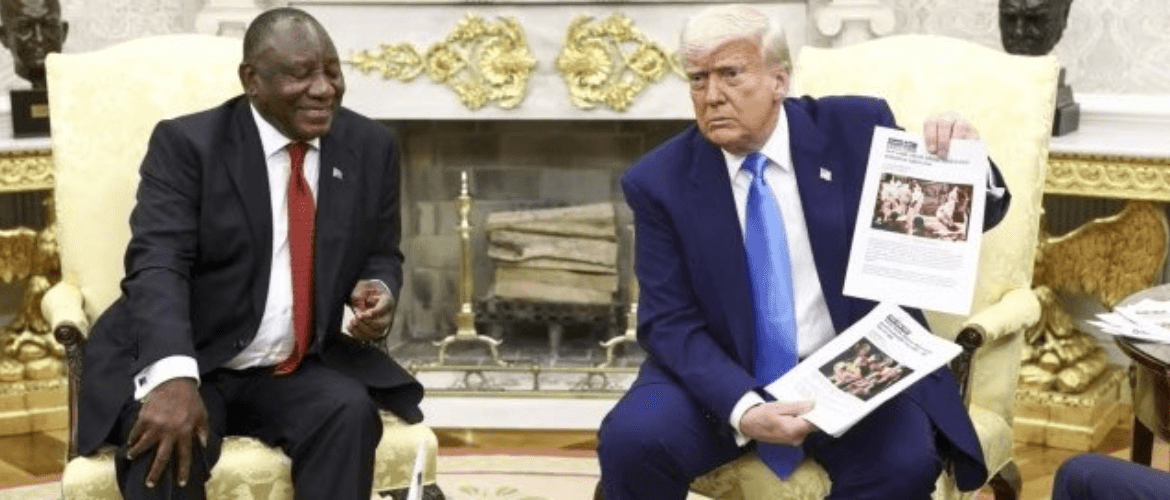Introduction: Confronting Racial Memory in a Globalized Age
The 21 May 2025 meeting between South African President Cyril Ramaphosa and U.S. President Donald J. Trump serves as a revelatory moment in global diplomacy. More than a routine engagement, it reflects clashing historical memories, political mythologies, and theological misreadings of justice. This paper seeks to assess the theological significance of this event, with particular emphasis on South Africa’s apartheid past and the Church’s prophetic role in fostering truth, justice, reconciliation, and peace through the lens of Kingdom righteousness.
Historical Context: Apartheid and Its Enduring Legacy
Apartheid (1948–1994) was a regime of legalized racial discrimination in South Africa. Enshrined in law by the National Party and supported by white Reformed theology, apartheid created systemic segregation in education, housing, land ownership, and political representation.1 Land dispossession under the 1913 Land Act and its successors remains a festering wound in post-apartheid society. While South Africa transitioned to democracy in 1994, the socio-economic structure of apartheid persists, with land reform remaining one of the most contentious and unresolved issues.2
The Trump–Ramaphosa Meeting: A Crisis in Narrative
The meeting was intended to strengthen bilateral ties. However, Trump used the occasion to confront Ramaphosa with a controversial video montage featuring Julius Malema chanting “Shoot the Boer,” overlaid with images of white crosses, which Trump claimed were the graves of white farmers allegedly targeted in a campaign of racial genocide.3
Ramaphosa denied the accuracy of these claims and stressed that land reform is a constitutional effort aimed at rectifying historical injustices.4 Nevertheless, Trump’s framing aligns with a global right-wing narrative that interprets post-colonial redress as reverse racism, thereby distorting historical causality.
Theological Considerations: Memory, Justice, Peace, and False Equivalence
- Truth and Historical Integrity
Scripture places immense value on truthful remembrance. Israel was commanded to remember both divine deliverance and human oppression (Deut. 5:15; Ps. 78). Theological memory must not sanitize oppression or fabricate victimhood narratives. Trump’s presentation, devoid of apartheid’s historical context, constitutes what Miroslav Volf terms “remembering wrongly,” a form of memory that perpetuates injustice.5
- Kingdom Righteousness and Restorative Justice
The Gospel of the Kingdom, as preached by Jesus, centres on righteousness and justice as the foundation of God’s throne (Ps. 89:14). Kingdom righteousness (δικαιοσύνη in Greek) is not merely individual piety, but right relational order—justice applied in systems, structures, and society. In Matthew 6:33, Jesus commands us to seek first the Kingdom of God and His righteousness, which demands that unjust economic, racial, and social systems be confronted and corrected.
Land reform, within this framework, is not simply a political issue but a matter of Kingdom justice. It represents an attempt to realign South African society with the moral order of heaven—an order that remembers the Jubilee mandate (Lev. 25) and the prophetic rebuke against those who “join house to house and field to field” (Isa. 5:8).
- Peace as a Hallmark of the Kingdom
Peace (Hebrew: shalom; Greek: eirēnē) is a critical expression of God’s Kingdom. It is not merely the absence of conflict, but the presence of wholeness, harmony, and well-being. Isaiah prophesied the Messiah as the “Prince of Peace” (Isa. 9:6), and the New Testament affirms that Christ “is our peace” who has broken down walls of hostility (Eph. 2:14).
In the South African context, true peace cannot be achieved by masking historical wounds or promoting skewed narratives. As James 3:18 affirms, “Peacemakers who sow in peace reap a harvest of righteousness.” Therefore, a Kingdom pursuit of peace must be anchored in truth, justice, and reconciliation—not political expedience or racial fear-mongering.
Where justice and peace meet, the Kingdom of God is manifest (Ps. 85:10).
- Reconciliation Without Repentance
True reconciliation requires repentance, confession, and restitution (Luke 19:8–10; 2 Cor. 5:18–20). The weaponization of white farmer narratives without acknowledgement of apartheid atrocities constitutes a false equivalence that undermines reconciliation. It echoes the lament of Jeremiah 6:14: “They have healed the wound of my people lightly, saying, ‘Peace, peace,’ when there is no peace.”
- The Church’s Prophetic Role
The Church is not called to be a passive observer but an active participant in confronting historical and systemic sin. As guardians of truth and agents of the Kingdom, ecclesial leaders must:
- Reject revisionist narratives that erase the pain of apartheid.
- Promote informed theological discourse on justice, peace, and land reform.
- Declare the righteousness of God not only as a heavenly hope but as an earthly imperative.
- Equip believers to discern between propaganda and prophetic truth.
- Pursue Kingdom peace that is anchored in righteousness and truth.
The global Body of Christ must stand with South Africa in its journey toward justice and wholeness, offering moral clarity, advocacy, and solidarity. Kingdom righteousness and peace must be preached not only in sermons but embodied in the policy positions the Church supports.
- Conclusion: A Kairos for Prophetic Discernment
The Trump–Ramaphosa meeting is not merely a diplomatic episode but a theologically charged moment. It compels the Church to examine how historical memory, justice, peace, and political narratives intersect in the pursuit of truth. The prophetic witness of the Church in this hour must be marked by courage, clarity, and compassion, proclaiming the Kingdom of God as the standard by which all nations are judged.
Kingdom righteousness and peace are not abstract concepts but the manifest reality of God’s reign breaking into history through just governance, equitable land distribution, and truth-telling in the face of power. This moment is a clarion call to seek first the Kingdom and to stand in solidarity with those pursuing the restoration of justice and peace in South Africa and beyond.
Footnotes
- Leonard Thompson, A History of South Africa (Yale University Press, 2000), 192–197.
- Ben Cousins, “Land Reform in South Africa: Is It Meeting the Challenge?” Policy Brief 3, University of the Western Cape, 2007.
- BBC News, “Trump Confronts Ramaphosa with White Genocide Video,” May 21, 2025. https://www.bbc.com/news/articles/ce9vvljen0xo
- AP News, “Ramaphosa Denies Genocide Claims at Trump Meeting,” May 21, 2025. https://apnews.com/article/trump-ramaphosa-south-africa
- Miroslav Volf, The End of Memory: Remembering Rightly in a Violent World (Eerdmans, 2006), 27–34.





